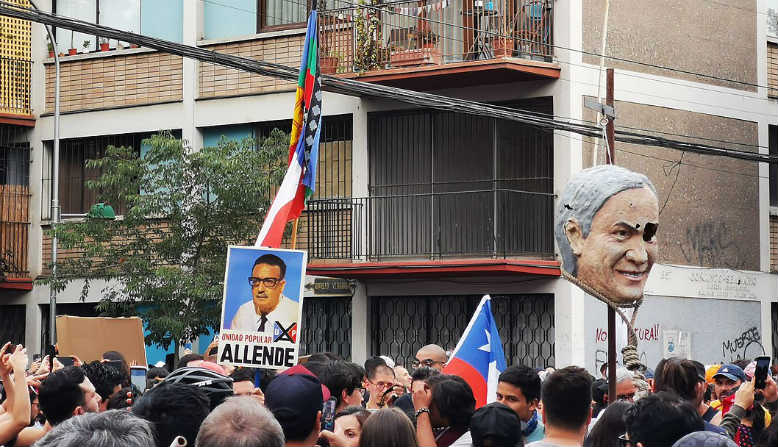 The largest march in Chile, in Santiago Photo: Wikimedia Commons
The largest march in Chile, in Santiago Photo: Wikimedia Commons
Chile’s uprising began with school pupils protesting and escalated to a general strike. Is this the beginning of the end of neoliberalism in Latin America?
Over the last month, Chilean protesters have delivered a historic hammer blow to neoliberalism in South America in response to mounting inequality and austerity measures.
While long held up as one of the region’s great economic success stories, the gap between rich and poor in Chile has been rapidly growing in recent years, with low pensions and a regressive private health insurance system hitting working-class people hard.
Resentment to this inequality has long been bubbling under the surface, but after Chile’s president, Sebastian Piñera announced crippling austerity measures at the beginning of October, it soon exploded.
It began with school pupils refusing to buy tickets on the Santiago metro after a significant price rise, part of Piñera’s austerity programme.
Less than a fortnight later Piñera declared a state of emergency, a measure not used since 1987 when Chile was still under the neo-fascist control of Pinochet. This decree introduced a curfew and brutal police repression, emboldening Piñera to then deploy the military against protesters.
Disingenuous government statements of conciliation were ignored as demonstrations continued to grow, leading Piñera to extend the state of emergency throughout much of the country.
From this point police and military repression escalated, killing many protesters and, in turn, leading to even larger demonstrations across the country. The more savage the repression, the greater the protests.
Much like the recent protests in Ecuador, government officials in Chile have been eager to blame Venezuela’s Nicolas Maduro for the protests.
This all happens as Chile’s military and police have been reported as firing live ammunition and beating protesters to death.
Meanwhile, protesters have spoken to me of regular human rights violations and seemingly unaccountable violent behaviour.
On 23 October, in a humiliating defeat, much like his Ecuadorian counterpart, Sebastian Piñera was forced to apologise for the inequality and suspended the austerity measures.
Trade unions responded by calling a general strike and on 25 October, the Chilean people staged the largest demonstration in the country’s history, demanding Piñera’s resignation. An estimated 1.2 million lined the streets of Santiago, with others gathering across Chile.
A day later, Piñera declared that he had asked all his ministers to resign, promising a new cabinet and government, and a lasting end to the state of emergency.
Piñera’s austerity measures are dead and with it, neoliberalism in South America has experienced another crushing defeat.
The Chilean people are celebrating a historic victory; they must now stay united to keep the right out and fight for a different future.

